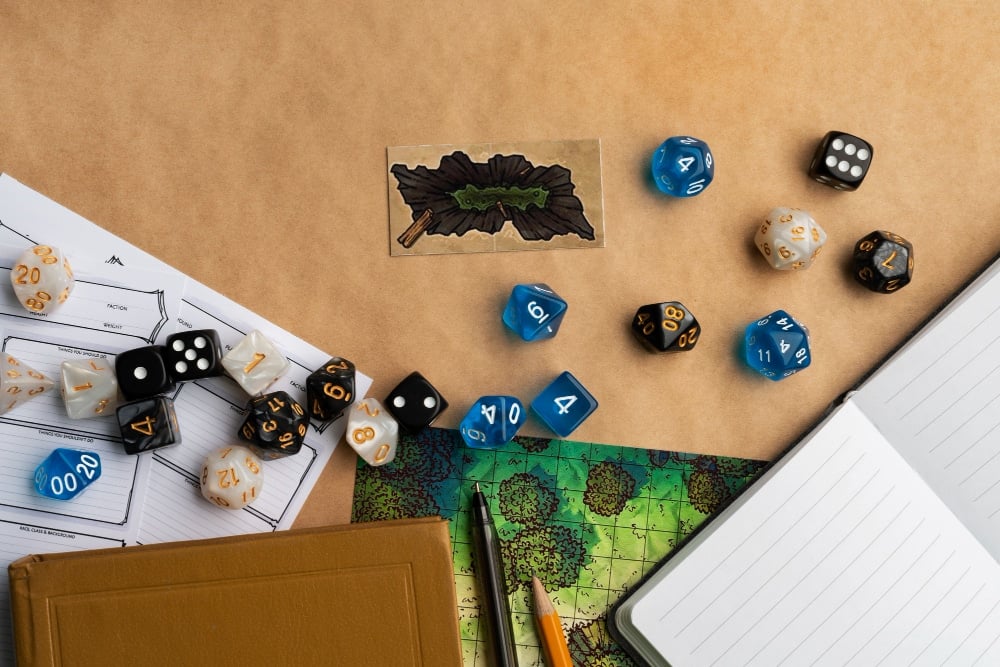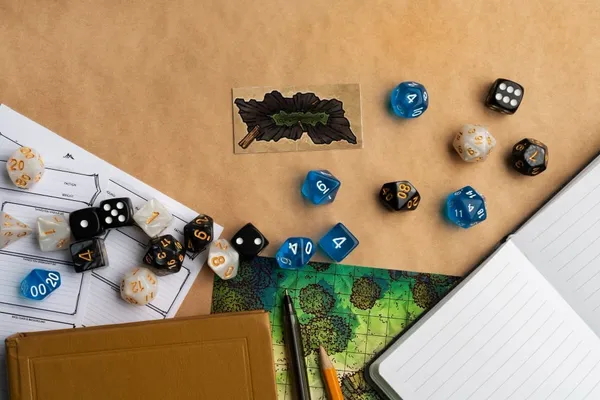If you're a Dungeons and Dragons fan, you know that game night is the best night of the week. But if you want to make your game nights even better, you need to follow these tips! This article will discuss how to organize your game night so that everyone has a great time.

Pick The Right Races
Races are the first thing you need to think about as they will dictate the overall style of the game you're hosting.
Lots of modern D&D players decide to include the Warforged 5E because of their willingness to take on any challenge. Depending on what kind of game you're hosting, the races are essential.
For example, picking the right races for your players is an important part of organizing a great game night. It’s important to understand that not all races are created equal, and picking the wrong ones can lead to unbalanced parties or even difficulty completing certain tasks.
That said, picking the right races can make your game nights more enjoyable with less frustration. When determining which races to pick for each player, consider their playstyle as well as how it fits into the overall story. Races like elves, halflings, and dwarves provide extra utility through special abilities that enhance gameplay in various ways. On the other hand, picking more common humanoids such as humans or orcs can lend itself to easier group dynamics due to familiarity and shared understanding between players.
Finally, picking the right races can also help to keep game nights interesting by allowing players to explore different elements of the game. By choosing a variety of races and classes, you can give players more options for creating unique characters with special abilities that match their playstyle. This can help keep them engaged over time and open up new opportunities for learning and exploration.
Set A Clear Main Objective
The goal toward which all the players will be working should be set as a clear main objective. Doing so will help provide structure and focus to your game night, setting the tone and helping everyone understand what they are working toward, even if it’s something daunting like defeating an evil dragon!
It also allows you to break down the goals into smaller, more achievable tasks that can keep everyone motivated throughout the journey. Coming up with the main objective may require some brainstorming on your part (or discussing ideas with your players), but setting one helps ensure that all of your energy is dedicated towards a single end goal.
How To Organize A Great D&D Game Night
Once you have this key element established, you can use it as a foundation for setting other objectives within the campaign, such as side quests or mini-adventures. By setting and achieving these small goals, the players will be closer to their ultimate objective.
Use Effective NPCs
NPCs in Dungeons & Dragons games can be a great way to create interesting and engaging plotlines. Properly using NPCs can help players stay engaged with the game, as they are exposed to more diverse personalities, experiences, and storylines. However, using effective NPCs is not always an easy task.
Make sure that your NPC characters have distinct personalities and motivations as this will help your players interact with them in meaningful ways. Additionally, you should consider how the NPC fits into the story. If possible, try to have the NPC’s backstory tie into the adventure’s plotline. Finally, remember to give each NPC some unique quirks or attributes to make them stand out from the rest.
Create An Encounter List
You should also have a great random encounter list everyone will enjoy. Here are some popular examples:
- A mysterious shack in the woods
- A dragon's lair
- A group of bandits attacking a caravan
- Undead rising from their graves to menace travelers
- An ancient ruin filled with traps and treasures
Create an encounter list that is tailored to your campaign. You can use any combination of creatures, monsters, and NPCs that you'd like. It's important to think ahead and create several encounters for each adventure session so you don't run out of ideas mid-game. Here are some tips for creating great encounters:
- Make sure they're challenging but not too hard.
- Add elements of surprise like unexpected NPCs, traps, riddles, or puzzles;
- Keep it unpredictable
- Make sure it fits with the storyline
Creating a great encounter list is an important part of creating an awesome game night for everyone involved.
Think About The Geography
The geography of any D&D game should be carefully considered before the game night begins. Geography can add a whole new level of adventure, challenge, and excitement to your D&D game. Consider what kind of environment you would like to create. It could be a fantasy world, an alien planet, or just a dungeon in our own world. Each type of environment will require different rules and challenges depending on its geography.
Once you have determined the setting and geography, think about the different environments players might explore during their journeys, such as forests, deserts, ruins, or even underwater locations. Decide which areas are safe havens they can rest in and which ones may be full of dangerous creatures that could harm them.
Set Relevant Rules
A firm rulebook everyone has to stick to is essential for a successful Dungeons and Dragons game night. It's important to define roles, set turn order, determine how quickly the game should move, establish when it is okay to talk out of character, lay down appropriate expectations regarding behavior in the group setting, and figure out how cooperative problem-solving will work.
Creating an agreed-upon rulebook before the game even starts helps keep everyone on the same page during gameplay. Not only that but setting rules also helps build trust between players by setting expectations and boundaries right away.
It's helpful to think of your party’s rulebook as a living document; this means that you can adjust it depending on the situation or if your players have different preferences! If a particular rule isn’t working, you can simply adjust it instead of getting rid of it.
Create Time-constrained Events
Time-constrained events are great for creating a successful and enjoyable Dungeons & Dragons game night. When creating these events, it's best to provide players with an allotted amount of time to complete certain tasks or reach certain objectives in-game.
This helps keep everyone focused and on track, which can be difficult when there are many people playing at once. Additionally, setting up a timer or a countdown clock at the beginning of the session can be a great way to keep players on task and remind them that their time is limited.
Write A Script
As a dungeon master, you need to keep everyone excited and entertained, so it's suggested that you devise a good campaign. Writing one can help you organize your ideas and make sure the game night runs smoothly. A script will also give you an outline of all the important events, locations, characters, monsters, and plot twists that occur throughout the session.
Creating a script is relatively straightforward. Start by writing down key elements such as locations, NPCs (non-player characters), and items that will be necessary for the story to unfold correctly. You should also jot down ideas for possible puzzles or interesting conversations between PCs (player characters) and NPCs.
Once these are established, it's time to write out scenes for each step of the adventure, including any monologues or pieces of dialogue to help move the story forward. Lastly, consider adding detailed descriptions of all the places, items, and characters that will be encountered during the game.
Invite The Right People
To make this game night event magical, you should invite people who are truly invested in Dungeons & Dragons. While inviting a few who don't know the game can be fun, inviting too many unfamiliar people or those that may not be totally committed to the activity can end up being distracting and detrimental to everyone's experience.
The best way to invite the right people is by talking directly with each individual to get an understanding of their level of interest in D&D. Ask them if they have any knowledge of the game, what kind of characters they like, and how often they plan on playing. Invite those who are most passionate about it and you'll be sure to create an engaging atmosphere for your gaming night!
Create A Relaxing Atmosphere
Finally, make sure everyone has a good time by creating a relaxing atmosphere for your D&D game night. Make sure the room is comfortable and inviting, with plenty of relaxation options available like extra pillows or blankets as needed. Have background music or white noise playing to keep everyone in the mood without creating a distraction.
Encourage breaks throughout the evening by suggesting activities such as snacks and drinks, stretching, taking a walk, etc. Setting up an atmosphere that's conducive to relaxation makes it easier for players to focus on their characters and get into the flow of the game without distractions from outside sources. With all these elements in place, you're ready to host an unforgettable game night!
Dungeons & Dragons have been a popular board game for decades now and are beloved because you can create your own narrative. Make sure to pick the right races and set a clear main objective for the trailers. Be careful when crafting NPCs and create an encounter list everyone will love. Think about the geography of the game and make sure to set relevant rules everyone agrees upon.
It's also important to devise some time-constrained events. In order to make it all work, make sure to write a good but flexible script. Finally, invite the right people to the event and create a good atmosphere. Have fun!








